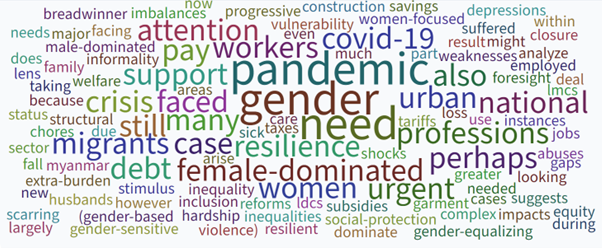In July 2023, the International Development Research Centre (IDRC) and the Institute of Development Studies (IDS) hosted a series of online learning events which explored and showcased learning and impact from the Covid-19 Responses for Equity (CORE) programme. The events brought together researchers and funders to consider the implications of CORE’s main areas of learning for managing multiple crises and building the resilience of the most vulnerable. They facilitated conversations around future research collaborations for building resilience and equity, shaped around three key areas of learning:
- Informality and marginalised groups in crisis response;
- Shockproof and inclusive fiscal policies;
- Equitable support for livelihoods and food.

Whilst the three events focused on different themes, there were some clear, overarching messages that emerged. Cutting across these were issues relating to governance, gender, inclusivity, and social justice:
- Building resilience. The pandemic exacerbated pre-existing inequalities. Prioritising progress to the Sustainable Development Goals (SDGs), particularly amongst vulnerable and marginalised groups, will help to build resilience to future shocks.
- Social protection. Governments should invest strongly in social protection mechanisms. This is crucial to build the economic resilience of vulnerable groups such as women, youth, and the elderly, to prevent them from falling below the poverty line and build their resilience to long-term shocks.
- Gender. Ensuring future responses are not only gender-sensitive, but specifically targeted at women, is crucial. Women were shown to be disproportionately negatively affected in employment, social safety nets and economic policies, care burdens, gender-based violence, and sexual and reproductive health access.
- Fostering collaboration and localised responses. Many of the most effective responses involved collaboration at multiple levels (such as local and national governments, civil society, the private sector) and across sectors. Grass roots organisations often provided the localised context to responses and extended government services beyond their existing reach.
This learning guide draws out the key messages and learning from across the three events.